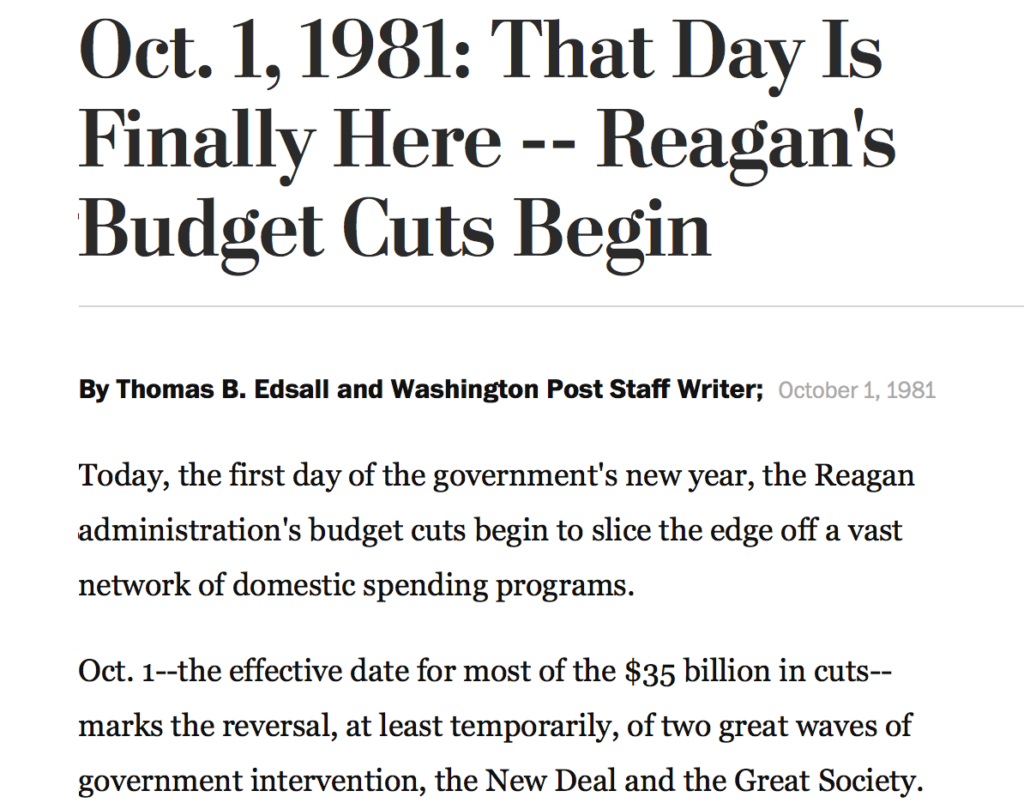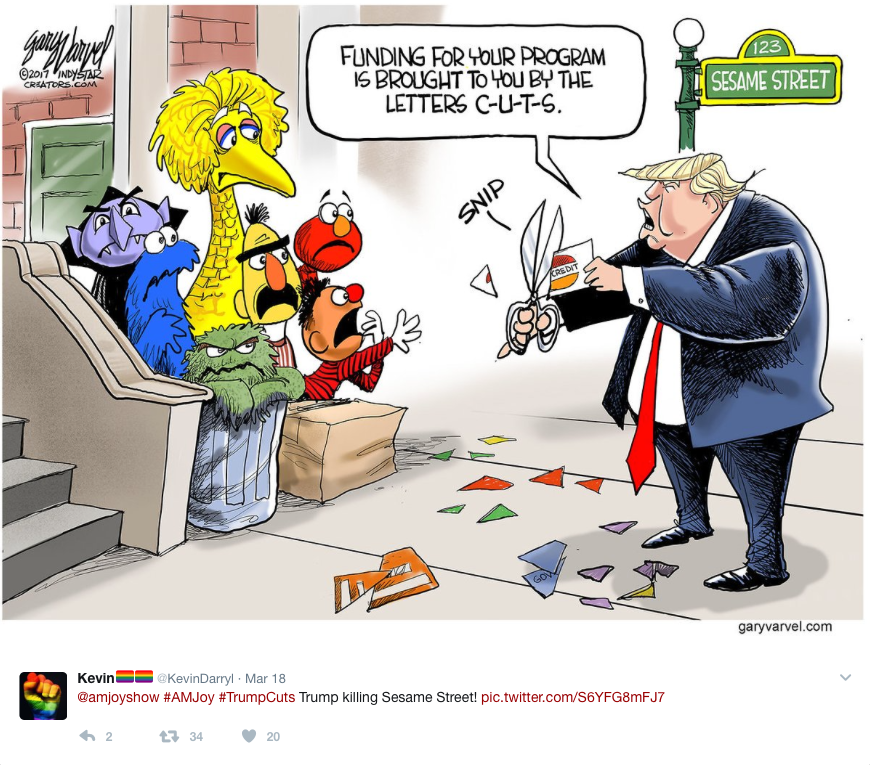Watching the news and social media over the last week or so produced a strange, non-specific sense of deja vu in me. I couldn’t quite put my finger on it until I saw some teeth gnashing and garment rending on Twitter about President Trump stabbing Big Bird in the heart with rusty scissors.
That’s when I realized I’d seen this movie before . . . back in 1981 in the opening months of Ronald Reagan’s first term.
Reagan ran on rebuilding our national defense and cutting the size and reach of the national government. He’d even promised to eliminate the recently created Department of Education—established by Jimmy Carter to help the teacher’s unions strengthen their grip on the nation’s education policy.
As History shows, Reagan proved unable to keep that or most of his other promises related to shrinking the ever-expanding super-state. In fact, with Democrats in charge of both houses of Congress throughout most of his two terms, the best Reagan could manage was to slow the rate of growth.
But that didn’t keep the liberal media and political opposition from depicting him as a heartless fiend who delighted in oppressing widows, orphans, the poor, and the homeless.
To hear the wailing and caterwauling, one would have been forgiven for believing Reagan was personally running from hospital to hospital unplugging preemie infant incubators and cackling hysterically, twirling a long black moustache, as he shoved widows out of the second story windows of their homes.
Those “Reagan budget cuts” became a one-size-fits-all phrase for attributing to Reagan every individual hardship or hard luck story anywhere in the world. Each evening’s newscast featured the most pitiful story the reporters could dig up.
Every item about a layoff, flu epidemic, tornado, and pothole became an opportunity for some man on the street to condemn “them damned Reagan budget cuts.”
Which brings us to this week, wherein I made the mistake of taking a peek at Twitter. In a few short minutes I found literally scores of things like this:
Now, Donald Trump is no Ronald Reagan. My reservations about Mr. Trump are well documented in previous posts. Nevertheless, 36 years later, this is a pure repeat of 1981.
Of course, this is a propaganda war, and facts don’t really matter. Even so, the facts about Sesame Street are:
- Mr. Trump’s proposed budget—which has to be approved by the House and Senate—cuts funding for the National Endowment for the Arts.
- The NEA, on the whole, is an appalling boondoggle-y waste of taxpayer money.
- Yes, the NEA used to help fund creation of new Sesame Street episodes. But that’s done by HBO now. PBS only runs old episodes of SS.
- So NEA cuts will likely have no effect on production of Sesame Street. But even if they did, corporate America or the billionaire liberal funders of our weekly protests could easily fund it out of spare pocket change.
- The licensing for Sesame Street characters is essentially a money printing machine.
Pause to consider the irony of the outpouring of liberal outrage here. The folks at Sesame Street allowed themselves to be acquired by a premium cable channel that the poorest Americans cannot see. But it’s Mr. Trump who is evil-personified for cutting the budget of the ridiculous NEA.
As I said, what we’re witnessing is a propaganda war against Mr. Trump’s efforts to restore some fiscal sanity and boundaries to national government spending; and restore our neglected defensive capabilities in an increasingly dangerous and volatile world.
Celebrities are doing their part. Here’s the spectacularly wealthy author Stephen King taunting the elderly people ands shut-ins who voted for Trump concerning (grossly misleading false) reports of cuts to the federal “Meals on Wheels” program:
This is despicable. Sadly, it would probably never occur to a Progressive like Mr. King that some patriotic older Americans might not vote based purely on what most benefits them personally. Or that some of the few surviving members of the “Greatest Generation”—who grew up during the Great Depression and weathered the rigors of World War II—might just care more about their nation’s future than their own comfort.
Or that they might understand what few liberals seem to grasp—that it’s better when local charity is funded at the local level, where there is more accountability and less opportunity for waste and graft.
Unfortunately, King’s mockery isn’t the worst of it. Here’s Pulitzer Prize winning columnist for the New York Times, Nicholas Kristof, yesterday:
Dear God in heaven. If there is a more reprehensible form of political argumentation than the above, I don’t know what it is. There has been an ongoing human tragedy unfolding in Yemen for a couple of years now, but until yesterday, the only people who seemed to care were a handful of conservative groups.
It’s not wrong to care about tiny Udai above. On the contrary, it’s essential. What’s wrong is choosing to care only when you can use him as prop to score points against your political “enemy.”
Several people I follow noted that within a few days of Mr. Trump’s election, we suddenly started seeing hand-wring-y news reports about America’s “homelessness crisis” after an eight-year disappearance. It astonishing how we had our homelessness problem solved for eight years but that it’s suddenly back with a vengeance.
Journalists have also just discovered that presidential vacations cost a lot of money, after eight years of utter obliviousness to that reality.
Again, all of this represents a repeat of 1981 (Reagan’s election) and in some respects 2001 (George W.’s). As I point out from time to time on this site . . . “We’ve seen this before.”
H H H H H
There is a complementary pair of assumptions underlying this hysterical resistance to cutting federal spending. One, that is pretty much an article of faith for most people today. It is:
- If a thing is good, the national government must fund it, or even better, mandate it.
- If a thing is bad, the national government should ban it.
At it’s heart, this brand of thinking is a form of idolatry. It assumes a powerful, centralized government can and should be:
- the bestower of all blessings.
- the judge of all vice,
- the coercer of all virtue,
- the insulator from all negative consequences from bad choices,
- the picker of all winners and losers.
It’s messianic and utopian. The problem for the Christian is that we already know Who the Messiah is, and it ain’t Uncle Sam. Yet Government is a jealous god. (See this great essay for more on that.)
It’s 1981 again. But this time around I don’t have a full head of hair or a soon-to-be-obsolete collection of eight-track tapes.







Well said David